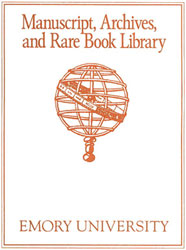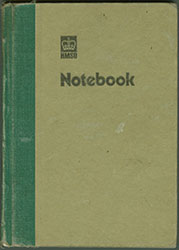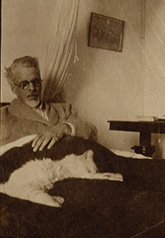 MARBL is staffed by an eclectic group of people who are knowledgeable, friendly and witty lovers of special collections. Periodically, they'll introduce themselves to you here on the blog by telling you how they got into the world of manuscripts, archives and rare books, and what they love most within MARBL's collections.
MARBL is staffed by an eclectic group of people who are knowledgeable, friendly and witty lovers of special collections. Periodically, they'll introduce themselves to you here on the blog by telling you how they got into the world of manuscripts, archives and rare books, and what they love most within MARBL's collections.
by Elizabeth Chase, Coordinator for Research Services, MARBL
I grew up in a fairly small town in the middle of a very small state: the Atlanta metropolitan area has a population approximately four times the size of the state of New Hampshire. While my childhood was spent in a place that often felt idyllic and sometimes felt confining, my local library was always the former, never the latter. I checked out copious numbers of books, sometimes reading the same book multiple times a year. There was one volume I checked out often enough that when the library decided to remove it from the collection, they gave it to me.
My love for reading turned into a double major in English and Political Science, but when my sophomore advisor asked me which was my “practical major,” I stared at her in silence. The thought that I would have picked either major based mainly on practicality hadn't occurred to me. Maybe it should have, but I am also grateful to my younger, excited, naïve self that I did not. My enthusiasm and my naïveté carried me through my undergraduate career. My disregard for the practicality of some of my course choices meant that I remained blissfully ignorant that someone considering graduate school should take literary surveys and instead enrolled in courses such as “The Irish Literary Revival.”
This course is, in many ways, where my professional story starts. I fell in love with the literature I was reading, full of humor, irony, pain, and a deep need to understand the relationship between the world of literature and the world of politics and ethics. After the course ended, I wasn't ready to sever my ties with the materials; I worked as a research assistant, eventually traveling to Ireland to check footnote information and gather resources in the National Library. My access card also gave me permission to enter the Manuscripts Reading Room, where archivists brought me letters from Patrick Pearse to Lady Augusta Gregory.

One of Ciaran Carson's Notebooks
And again, I wasn't ready to stop there. I loved that there were places where I could sit surrounded by not just published works, but all the random thoughts, doodles, letters, and photographs that document their creation. So I applied to graduate school, and finally moved to Atlanta, to a much bigger city and a much bigger library. When I visited Emory, a current student brought me up to MARBL to show me the Irish literary materials I would have at my fingertips as a student. She showed me a notebook of poem drafts by Ciaran Carson, a Northern Irish poet whose second volume is titled The Irish for No, there being, ironically, no word for no in the Irish language. When I was accepted, my first email was to the Chair to say thank you. My second was to Dr. Ron Schuchard, to find out how I could get a graduate student job in MARBL.

W.B. Yeats in bed with his cat
I started working in MARBL as a first-semester PhD student, helping to unbox the then-recently-acquired Raymond Danowski Poetry Library. Over five years, I worked in most divisions within MARBL, but found my greatest satisfaction in teaching with the materials these collections contain. Two of my favorite items from MARBL's W.B. Yeats' collections are pictured here: One shows the poet with his cat in his lap, undercutting the striking image of the consummate poet we are so used to seeing. Here, we see the man who sits down to breakfast. The second is a letter from Maud Gonne to W.B. Yeats; in it, she responds to his famous poem, “Easter, 1916,” beginning right off the bat with “No I don't like your poem.”

Excerpt of letter from Maud Gonne to W.B. Yeats stating “No I don't like your poem.”
These items, and many others in our collections, give students a sense of the lived lives behind the published poems and novels. As a reader and teacher of literature, it is this I want them to discover and appreciate. And it was this that led me to get a library science degree and take up a career in libraries, where I can share my excitement and the wonder I feel, and have always felt, when stepping into such a place.
